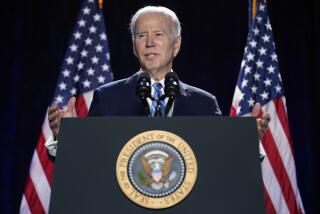GOP’s Flu Plan Would Shield Makers
- Share via
WASHINGTON — Republican lawmakers are moving swiftly to enact one part of President Bush’s flu plan -- a liability shield for vaccine manufacturers -- while issues such as compensation for people injured by adverse reactions and funding for the proposal remain unresolved.
Senate Majority Leader Bill Frist (R-Tenn.) wants to attach liability protections to a must-pass spending bill slated for quick action, spokeswoman Amy Call said Wednesday. That would bypass the cumbersome process of committee hearings and floor deliberations in each chamber.
But Frist’s proposal does not include a compensation program for victims, and the House and the Senate disagree over how to pay for Bush’s plan.
The president has asked for $7 billion in emergency funding to increase vaccine production and stockpile antiviral drugs against the threat of a worldwide flu epidemic. Influential House Republicans want the funds to come from cuts in other programs.
The legislative maneuvering over liability protections has angered Democrats, who have blocked limits on jury awards in medical malpractice cases -- a cornerstone of the GOP agenda at the beginning of the year.
And it has raised concerns among public health advocates, who fear that national preparations for a possible flu pandemic could be set back by partisan fighting over the perennially contentious issue of liability.
“To have the liability protections sitting out there without the funds to enhance vaccine production capacity is just not acceptable in this country,” said Kim Elliott, deputy director of the Trust for America’s Health, a nonprofit advocacy group urging action on any pandemic threat. “Not to move the entire [flu] package together is a disgrace.”
“I’m alarmed that something of critical importance is being discussed and handled in a back-room deal,” said Sen. Christopher J. Dodd (D-Conn.), a senior member of the Health, Education, Labor and Pensions Committee.
“It makes no sense to try to rush this thing through in the darkness of night,” said Sen. Edward M. Kennedy (D-Mass.).
Frist’s spokeswoman said the Republican plan was limited.
The liability protections would apply only to vaccines and other medicines against a pandemic flu or to a pathogen that might be used in a bio-terrorist attack, Call said. The Department of Health and Human Services would first have to declare an emergency, and the protections would have an expiration date.
“What it would do is protect these companies in time of a health emergency against frivolous lawsuits,” Call said. “People would still have a right to sue if a company is a bad actor or engages in misconduct.”
But litigants would face a significant hurdle before they could file suit. According to a draft of Frist’s proposal, Health and Human Services would be required to determine that a drug maker had engaged in “willful misconduct” before the case could go to federal court.
The draft defines such misconduct as “actual knowledge” that the vaccine would result in injury or death and “conscious failure” to address the risk.
Such a standard would be impossibly high to meet, Dodd said, noting that manufacturers would be shielded even in cases of negligence.
“I think there is a real danger people would not take these vaccines, and the program would be a failure,” Dodd said.
There is debate among economists and academics about whether fear of litigation has kept companies from developing and marketing new vaccines. Some argue that a weak market is the main problem for drug makers. Bush’s $7-billion proposal could change that.
Many in the public health community think liability protections are needed, but they say they should be paired with a compensation program for people who suffer adverse reactions.
“You can make the case that a pandemic vaccine will be virtually an experimental drug,” Elliott said.
More to Read
Get the L.A. Times Politics newsletter
Deeply reported insights into legislation, politics and policy from Sacramento, Washington and beyond. In your inbox twice per week.
You may occasionally receive promotional content from the Los Angeles Times.










